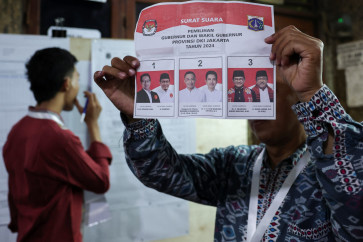Popular Reads
Top Results
Can't find what you're looking for?
View all search resultsPopular Reads
Top Results
Can't find what you're looking for?
View all search resultsROBERT LEMELSON: Filming mental illness
ROBERT LEMELSON
Change text size
Gift Premium Articles
to Anyone
R
span class="caption" style="width: 339px;">ROBERT LEMELSON. Courtesy of Robert Lemelson American anthropologist Robert Lemelson has spent the last 20 years documenting the lives of the mentally ill in Indonesia through films — the first person to do so in the developing world.
One of the few documentary filmmakers to explore psychiatric conditions in a non-Western context, Lemelson has made over a dozen films in Indonesia. He has focused on issues of diagnosis; care and treatment; and the impact of culture, family and community on the recovery of the mentally ill.
He said mental illness was a topic not spoken about openly in many parts of the world due to a lack of understanding, fear and shame of what it is and how it affects individuals and their families.
“Mental illness is one of the most devastating experiences known to humanity, and it has a profound effect on society in terms of lost productivity, human suffering and other negative social and health
implications.
“But there’s an increasing openness in Indonesian society and many previous taboo topics are being discussed more freely, including mental illness […] which reflects the increasing democratization and transparency.”
Indonesia is one of the most culturally diverse countries in the world, he said, and because of the openness of the people and complexity of society it was a wonderful place to do long-term research.
His films are yet to be shown to an Indonesian audience, but he plans to hold a series of screenings next summer. “Hopefully that can have a positive impact on public understandings of the lives of the mentally ill,” he said.
Lemelson began his research into the relationship of culture to psychiatric and neuropsychiatric disorders in 1993 in Bali and Java as a Fulbright scholar, eventually turning to documentary and ethnographic film to illustrate the themes his research was exploring.
He founded Elemental Productions in 2007, an ethnographic film company focusing on personal experience, culture and health in Indonesia and the United States.
“We hope our films can be used to educate, both at the university level and in society at large, and to provide understandings of the complex issues that the films grapple with,” he said.
His work has included the six-part series Afflictions: Culture and Mental Illness in Indonesia, which was based on more than a decade of clinical ethnographic research in Bali and Java.
The series looked at how culture has the power to protect the mentally ill or exacerbate their condition, whether how family members treat mentally ill members could shape outcome, and that to understand the experience of the mentally ill it was essential to understand their cultural universe and values.
His most recent documentary, Standing on the Edge of a Thorn, which was released late last year, is an intimate portrait of a family in rural Java grappling with poverty, mental illness and participation in the sex industry.
Although it did not win in its category, the film was one of three nominated as Best Documentary-style Reality Production at the prestigious Impact Media Awards last month. It was Lemelson’s second nomination in five years.
He also produced Forty Years of Silence: An Indonesian Tragedy, which generated some controversy because of its exploration of the mass killings of 1965-66.
When he is not filming in Indonesia, Lemelson works as an adjunct professor in the University of California — Los Angeles (UCLA) department of anthropology and as a research anthropologist at UCLA’s Semel Institute of Neuroscience.
He received his Master’s degree from the University of Chicago and Ph.D. from the Department of Anthropology at UCLA, specializing in Southeast Asian studies, psychological anthropology and transcultural psychology.
He is currently working on two projects based in Indonesia. One is a feature-length piece on genderized violence and kinship, the other a shorter piece on the use of traditional healing to treat mental illness in Indonesia.
His films are available through distributor DER.org, his documentary production company website www.elementalproductions.org and through Amazon.










